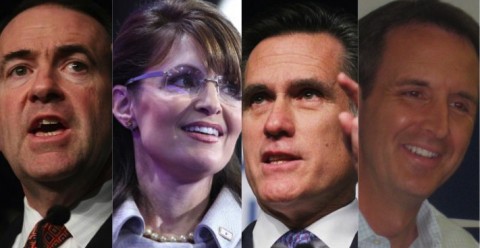Are Pundits Reading Too Much Into Iowa Gubernatorial Primary?
Analysts hailed the victory of a former governor over a Tea Party favorite as a sign of strength for Sarah Palin and Mitt Romney, and of weakness for Mike Huckabee, in 2012.
Jul 31, 2020243.3K Shares3.3M Views
Mike Huckabee, Sarah Palin, Mitt Romney and Terry Branstad (Lauren Victoria Burke/WDCpix.com)
Politico called last week’s Iowa gubernatorial primary victory by a former governor over a Tea Party favorite a win for Sarah Palin and Mitt Romney. Former presidential hopeful and conservative pundit Pat Buchanan also concluded the outcome on the GOP side was a boon for Palinand a bust for Mike Huckabee. And The Atlantic’s Marc Ambinder thinks the whole process has huge 2012 implications.
[Congress1] But on the ground in Iowa, the country’s first caucus state, people have a different perception, concluding that little can be gleaned from the results of last week’s primaries.
“People will try to derive some sort of bigger meaning, but it’s way too soon,” said Arthur Sanders, a professor of political science at Drake University in Des Moines.”Look at the [Des Moines] Register’s poll from a few days ago. They make a point of saying thata similar poll in 2006 didn’t include Barack Obama. We don’t even know who the candidates will be.”
Much of the focus has centered on the gubernatorial primary, which saw former four-term Gov. Terry Branstaddefeat the choice of tea partiers and evangelical conservatives, Bob Vander Plaats.
Vander Plaats received strong support from Mike Huckabee, the former Arkansas governor and 2008 Iowa Caucus winner. Branstad was endorsed by Mitt Romney, the former governor of Massachusetts who finished a surprising second to Huckabee in Iowa in 2008. Much of the staff of the two campaigns also mirrored the 2008 presidential contest, with Branstad picking up many of Romney’s former aides and Vander Plaats rebuilding Huckabee’s campaign team.
If Vander Plaats had won, so the theory goes, it would have proven that Iowa’s GOP is dominated by social conservatives, and thus, would have forced candidates like Romney to give up on the Hawkeye State. A Branstad victory, however, would mean a candidate with a focus on fiscal issues could still come to Iowa in 2012 and emerge victorious.
While that was a prevailing thought, Sanders says it simply isn’t so.
“What if [incumbent Gov.] Chet Culver beats Branstad this fall?” Sanders said. “Vander Plaats’ supporters will be energized. They’d say, ‘We told you so,’ and they’ll have more energy going into the presidential campaign.”
A Branstad victory this fall would energize the more moderate voters, Sanders said, and since caucus turnout is typically much smaller than primaries, that could have an impact on 2012.
Earlier this year, in an interview with The National Journal, Branstad adviser and former gubernatorial hopeful Doug Grossadmitted it wasthe 2008 Caucus resultsthat eventually led to him asking Branstad to join the 2010 campaign. Gross, who has repeatedlyexpressed his fear that social conservativesare steering the party more and more rightward and alienating moderate voters, vowed to do something about it.
“If we let a minority control a minority party, we’ll always be a minority,” Gross told The National Journal. “And that was a problem.”
But despite its similarities, the 2010 primary was a very different race than 2008. And with that in mind, its hard to believe the ramifications of last Tuesday’s vote will carry over to 2012, said Graham Gillette, who runs a public affairs/communications firm and occasionally blogs for The Des Moines Register.
“Terry Branstad ran a better campaign than Bob Vander Plaats,” he said. “That’s it. The Branstad message of fiscal restraint and the importance of a steady, experienced hand on the tiller of government sold better than Vander Plaats’ conservative social message.”
It all comes down to the political landscape leading into the caucuses and who gets into the race, Sanders said.
“We’ll have a better sense of things after the November elections,” he said. “We’ll see who controls congress and who wins in statehouses across the country. The state of the economy will also be important.”
So far, Iowa has seen its fair share of potential presidential hopefuls — Huckabee, Romney, Sarah Palin, Tim Pawlenty, Newt Gingrich, Rick Santorum, Ron Paul, John Thune, Mike Penceand Haley Barbour have all made recent trips to the state.
Jeff Patch, a longtime Iowa Republican strategist who currently lives in Washington, D.C., said he expects the Republican field in 2012 to be vast. And with a field that big, the Iowa Caucuses aren’t necessarily about winning or losing, only beating expectations.
“No one cares if a candidate ‘wins’ the Iowa caucus. They just need to beat expectations and spark momentum,” Patch said. “I volunteered for [John] McCain in the 2008 primary. He didn’t spend a ton of money, but he at least had a skeleton staff and visited with some regularity. Finishing a close fourth was enough momentum to propel him along to the nomination, or at least allow him to survive until New Hampshire.”
If pundits are looking for 2012 implications, Sanders said their focus should be on the November general election.
“That’s the one that will tell us something,” he said. “It’s just too early right now.”

Rhyley Carney
Reviewer
Latest Articles
Popular Articles
